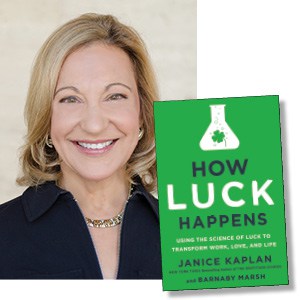
Janice Kaplan
Wednesday, April 10, 7:30 pm, Sandler Family Campus
On happy occasions we wish each other “Mazel tov!” and when we want something good to happen we hope that we have a little “mazel,” or luck. But good luck doesn’t just drop from the sky. People have more control over their futures than they sometimes realize. It turns out that luck occurs at the intersection of chance, talent, and hard work. In her latest book, How Luck Happens: Using the Science of Luck to Transform Work, Love, and Life, former editor-in-chief of Parade Magazine and author of New York Times bestseller The Gratitude Diaries, Janice Kaplan explores how a person can create their very own luck in love and marriage, career, health, and family relationships. Read on for a preview of how co-author, Dr. Barnaby Marsh taught Kaplan how to create luck.
Excerpt: Chapter One
Prepare to Be Lucky
Be open to opportunity…get the information you need…see what you’re not seeing…drive to the intersection of chance, talent, and hard work
Barnaby’s Luck Lab at the Institute for Advanced Study was tucked away amidst the beautiful wooded fields of Princeton, New Jersey—a perfect place for thinking big thoughts about the science of making luck. As we took a walk through the peaceful grounds together one morning, Barnaby told me that Albert Einstein wandered these same tree-lined paths while coming up with his famous theories. Our new ideas might not disrupt relativity, but we hoped they would change the way people thought about luck—and the possibilities for their own futures.
It had rained hard the previous night, and the sun hadn’t yet dried out the wet ground. Scooting around a puddle, I told Barnaby that writing my previous book, The Gratitude Diaries, had taught me that we have more control over our own happiness than we sometimes realize. I was delighted that the book had inspired so many people to lead happier lives, and I had a feeling that understanding how to make yourself lucky—in any circumstance—could have a similar effect.
Barnaby nodded. “If you’re driven to make your life a little better and wonder why things don’t always go your way, our new approach will let you claim the luck that should be yours.”
We both agreed that luck isn’t the same as random chance. If you flip a coin ten times to determine your future, you are relying on chance—and most people would agree that’s pretty silly. If you talk to people, prepare yourself, look for opportunity, and then jump on the unexpected events that might (randomly) appear, you are making luck. And that’s what we all need to do.
“Luck isn’t a zero sum game. There’s plenty of luck for everyone if you know where and how to look for it,” Barnaby said.
Barnaby thought the evidence was pretty clear that luck is not passive—it requires action, and many of the events that may seem like random chance are not so random after all. He was convinced that by understanding the underlying dynamics of luck, you can gain control over aspects of your life that once seemed to depend on chance, fate, or the phases of the moon. We would work together using insights and recent discoveries in psychology, behavioral economics, mathematics and neuroscience to develop a new way of understanding luck.
“We’re at the starting point of a brand new field and instead of finding the research we’re going to have to create it,” he said.
Callah Terkeltaub
Kaplan will visit Tidewater as a part of her Jewish Book Council Tour and the Simon Family JCC’s Lee and Bernard Jaffe Family Jewish Book Festival, in partnership with Jewish Family Service of Tidewater. This event is free and open to the community with RSVP required. For more information or to RSVP, visit JewishVA.org/bookfestival or contact Callah Terkeltaub at CTerkeltaub@ujft.org.
